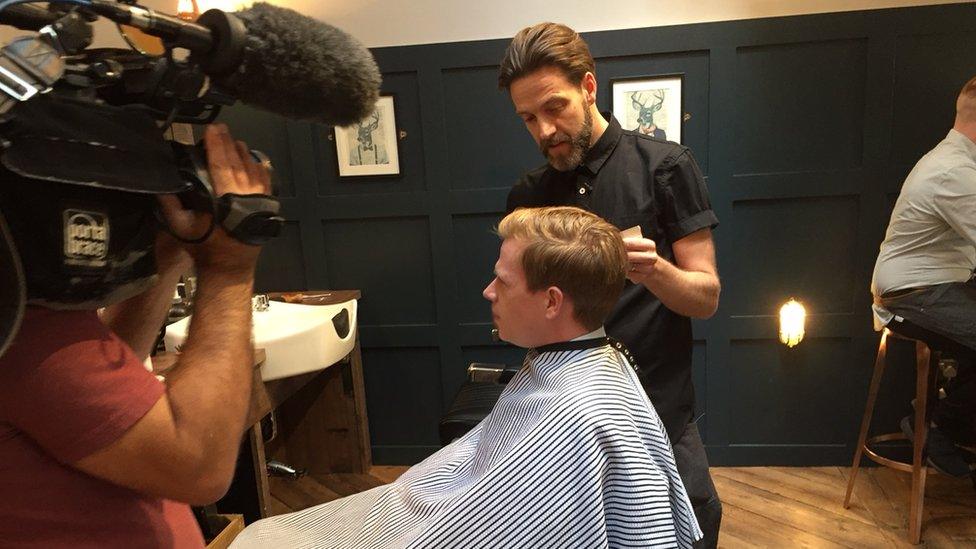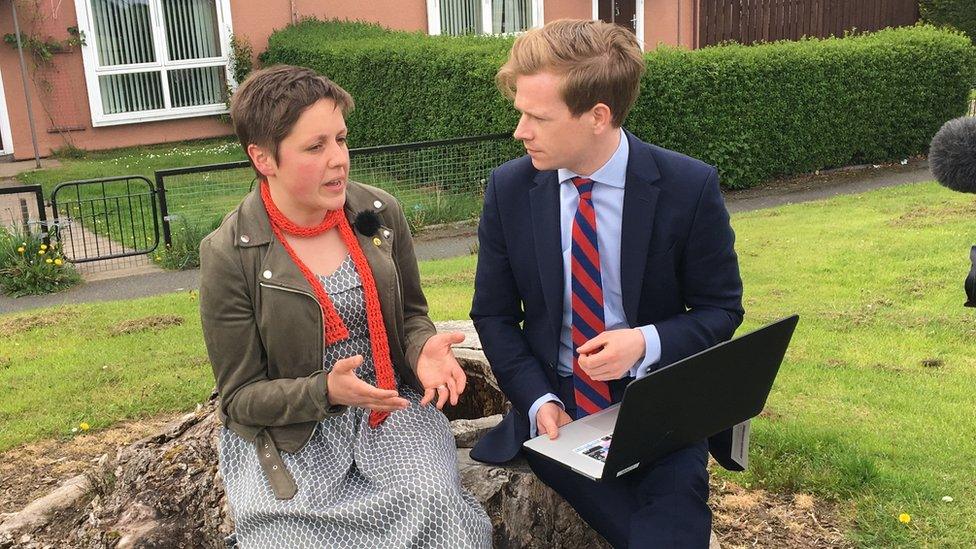General Election 2017: Is the economy working? And who for?
- Published

Dean Walker is training former oil workers as barbers
We've come to Aberdeen; a city synonymous with oil and gas. It's an industry which brought wealth and jobs to this city. But some have been left struggling since the slump in the price of oil.
Instant Neighbour food bank is one of nearly 40 in Aberdeen. It also doubles up as a shop for the local community. Staff and volunteers get donations from around the city, scrub them up and sell them on at affordable prices.
John Mulhern, who helps run the centre, says the food bank often struggles to cope with demand. Up to 50 people come to them for food parcels some days, and in recent weeks they've had to turn people away on occasion,.
"This time last year we were doing between 80 to 100 food parcels a week - we can now do up to 170 parcels a week at the moment," he says.
And he blames political decisions for that.
"It's to do with the benefit cap on families - which stops them from claiming anything in excess of £20,000 a year as benefit payments.
"It's reduced the amount of disposable income they've got and the income they've got to support their families."
Grace O'Keefe is the Conservative candidate in Aberdeen North. We put John's points to her.
She told me: "We obviously want to support families - caps have been introduced because we have to ensure that people are encouraged to go to work and that's why we want to improve job opportunities for people."
The Instant Neighbour food bank says it's never been busier
Prime Minister Theresa May argues the reasons for food bank use are complex.
But the SNP's candidate for the seat, Kirsty Blackman, thinks it's a sign the economy isn't working for many.
"The welfare state should be a safety net and it's not catching those people," she says.
'More expensive'
"The economy is clearly not working for everybody... people whose weekly shop is much more expensive than it previously was, while their wages are not rising, they don't feel like the economy is working for them."
But is it working for others?
We went to speak to Paul Clarkson, who runs a chain of bars in the city.
"We are still seen as quite popular venues to go to, but we're just not getting as many customers as before." he explains.
Until 2015, Labour had held this seat since the 1930s. Their candidate here is Orr Vinegold.

Kirsty Blackman won Aberdeen North for the SNP in 2015
"Labour has always been on the side of working folk and that's our pitch again at this election; the £10 minimum wage, investment in education, more money into the NHS which we hope will trickle into Scotland."
Isobel Davidson, the Lib Dem candidate, agrees that times are tough for some.
"There have been fairly substantial cuts in some people's wages yet they've still got the same bills to pay. We do need to look at a much wider economy."
Diversification is something of a buzzword here as Aberdeen looks to reduce its reliance on the oil and gas sector.
Fully booked
Dean Walker is something of an expert in the field. He runs an upmarket barber in the city centre (£35 a hair cut) and is retraining oil and gas workers to work in his salon. It takes about six month to get salon ready.
"I think they are sort of glad not to be just relying on the oil and gas sector now, it being as vulnerable as it can be and how quickly it can change."
Business here is good. The salon is fully booked most days.
Is the economy working for Dean? "Absolutely" he says.
Back at the food bank those views about diversification are echoed. But John is less optimistic about the future.
"I'm not sure about the economy in Aberdeen - I can only see it getting worse over the next wee while."
The full list of candidates for Aberdeen North in the general election on 8 June is Kirsty Blackman (SNP), Isobel Davidson (Lib Dem), Richard Durkin (Independent), Grace O'Keeffe (Conservative), Orr Vinegold (Labour).